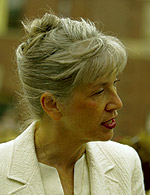Bates Matters

Elaine Tuttle Hansen, president. Our world deserves citizens educated to have hope and do good work even in the wake of serious errors, injustices, and missteps.
An Unmistakable Lesson
by Elaine Tuttle Hansen, President
I frequently find myself remarking that everyone at Bates is a teacher, everyone a learner. Even the president — or I should say, especially the president — is always learning.
This observation was confirmed in May as I prepared for our annual Baccalaureate ceremony during Commencement Weekend.
Readers who have not enjoyed a Baccalaureate in recent years may not know just how distinctive the Bates ceremony is.
Reflecting the unparalleled accomplishment of our students and the value we place on their engagement, this ritual event is planned and performed afresh each year by members of the senior class.
A sense of continuity, as well as ever-creative support, comes from our chaplain, Kerry Maloney. The only non-student participants are Kerry and myself.
In the spirit of this student-centered occasion, I was moved last year to craft a brief address about a book I had just read, on the timely graduation topic of “good work.”
My address incorporated some of what I had learned from talking to Bates students, who shared with me how they thought the College had prepared them for the world of work.
This year I decided to take this approach a step further and base my Baccalaureate remarks on student responses to another big question about the value of a Bates education.
So I e-mailed a few seniors I’ve come to know.
“It’s often said that the purpose of the best liberal arts education is to find out who you are and what you love,” I wrote. “(How) has your idea of who you are and/or what you love changed since you first arrived at Bates?”
This turned out to be a much harder question than I had thought. Many students resorted to the time-honored tradition of avoiding the question, telling me instead why the question was so difficult to answer.
But a few respondents struck a theme I hadn’t anticipated.
“Well,” one wrote, “I haven’t learned exactly who I am or what I love, but I have learned a lot about what I don’t like.” Another said, “Now I’m someone who at least knows how to make mistakes.” And a third noted, “What’s changed the most about me is that I’ve begun to see my own limits.”
At a time of the academic year when we focus on our students’ achievement and potential, it seemed at first incongruous to be talking about what they haven’t liked, the mistakes they’ve made, the limits they’ve perceived.
Yet the more I pondered these three comments, the more they reminded me of an important aspect of the Bates educational experience that other wise teachers understand so well.
In The Aims of Education (1929), the influential educational philosopher Alfred North Whitehead argues that in order for university students to acquire “the initial discipline of imagination in its period of youthful vigor” and “the habit of unbiased thought,” they must be “free to think rightly and wrongly” (emphasis added).
So, too, in her great poem about the cognitive power of failing and lacking, Emily Dickinson reminds us that
Success is counted sweetest
By those who ne’er succeed.
To comprehend a nectar
Requires sorest need….
The only certainty that lies ahead for Bates students, or for any of us, is that if we are lucky there will be ups and downs, good days and bad days. Or to put it more positively, if our reach always exceeds our grasp, as I believe it should, we need to know how to face disappointment and keep moving on. Our world deserves citizens educated to have hope and do good work even in the wake of serious errors, injustices, and missteps.
Of course, the members of the Class of 2004, like the many thousands of Bates graduates before them, are prepared to access their great potential and to know the sweetness of success. But I am grateful for their reminder, borne of mature self-knowledge, of this complementary hallmark of a great education: the courage to admit mistakes honestly, and the boldness to move beyond limits and fears with self-discipline, humility, and empathy.